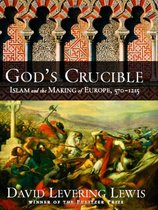
David Levering Lewis, two-time winner of the Pulitzer Prize, and many other awards, offers a book that provides an insightful and invaluable depiction of the land of Islam before its rise, and the movement of Islam through its expansion from Mecca, north into Asia Minor and Persia, and west across northern Africa, to finally cross the Straits of Gibraltar to spread across the Iberian Peninsula and with an attempt to conquer France. Indeed the mandate for each successive Muslim caliphate (the main Islamic central government, led by the caliph) was jihad (to spread Islam in any way needed), which meant in practice to expand the existing Islamic empire through war and conquest. Long before the European Christians launched the Crusades into the Holy Land, Muslims had been striving to expand into Europe and conquer it, and Islamic military history has its share of slaughter and mayhem. And contrary to the Crusaders goal of controlling the Holy Land so that Christian pilgrims could worship in peace, the Muslims were engaged in a centuries-long strategy of continual expansion of the caliphate, with the ultimate goal of establishing their faith as the one and only faith of the world.
In the vacuum of unified central power left after the fall of the Western Roman Empire, Islamic expansionism reached Europe in 711 and was not ultimately turned back till 1492. Indeed Europe was under constant threat from Islam for over three hundred years before Pope Urban II called the First Crusade. The historic Battle of Poitiers was a critical contest that would decide the very fate of Europe, where the Islamic expansionism was ultimately stopped and turned back. It was in contemporary accounts of this battle that the first reference to the term ‘Europeans’ is found. We also learn about Charles the Great--Charlemagne—and his critical role in uniting Europe, as well as the history of his grandfather Charles Martel—Charles the Hammer—who was also a critical figure in stemming the aggressive Muslim tide in Europe.
NYU Professor Lewis expels many preconceptions of the history of Islam, especially with its chapter of European control. I enjoyed this book a great deal, and found it easy for the lay person to read. It is rich in maps, and a timeline for helpful reference. I think with the current cultural debate of ‘what is Islam, and how does it fit in today’s world culture?’ that it is important for people of inform themselves, and understand the critical historical points of reference on this charged subject. I found God’s Crucible to be written from a neutral perspective, encouraging informed discussion on my part when I find myself in a conversation about this subject. I especially found the story of Mohammed compelling reading, and how the two branches of Islam split—the Sunni and the Shia—and how much that division has impacted world events today. You also learn interesting tidbits, such as the origin of the word Saracen, the medieval term Europeans used for Muslims: saraceni is Latin for ‘people of the tents.’
In the vacuum of unified central power left after the fall of the Western Roman Empire, Islamic expansionism reached Europe in 711 and was not ultimately turned back till 1492. Indeed Europe was under constant threat from Islam for over three hundred years before Pope Urban II called the First Crusade. The historic Battle of Poitiers was a critical contest that would decide the very fate of Europe, where the Islamic expansionism was ultimately stopped and turned back. It was in contemporary accounts of this battle that the first reference to the term ‘Europeans’ is found. We also learn about Charles the Great--Charlemagne—and his critical role in uniting Europe, as well as the history of his grandfather Charles Martel—Charles the Hammer—who was also a critical figure in stemming the aggressive Muslim tide in Europe.
NYU Professor Lewis expels many preconceptions of the history of Islam, especially with its chapter of European control. I enjoyed this book a great deal, and found it easy for the lay person to read. It is rich in maps, and a timeline for helpful reference. I think with the current cultural debate of ‘what is Islam, and how does it fit in today’s world culture?’ that it is important for people of inform themselves, and understand the critical historical points of reference on this charged subject. I found God’s Crucible to be written from a neutral perspective, encouraging informed discussion on my part when I find myself in a conversation about this subject. I especially found the story of Mohammed compelling reading, and how the two branches of Islam split—the Sunni and the Shia—and how much that division has impacted world events today. You also learn interesting tidbits, such as the origin of the word Saracen, the medieval term Europeans used for Muslims: saraceni is Latin for ‘people of the tents.’
 RSS Feed
RSS Feed
